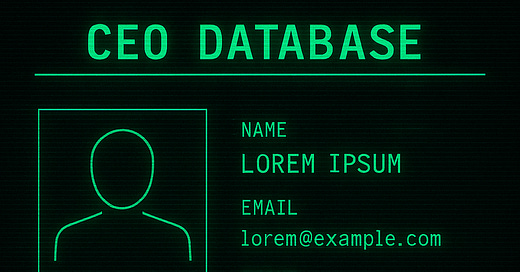Websites like luigiwasright.com mark a turning point. They don't just criticize corporate behavior—they target individuals by name, role, and address. They facilitate targeting and actions like doxxing under the guise of transparency and crowdsource outrage into action.
And it's not just one site.
Following the United Health Care CEO's murder, digital chatter across platforms such as Reddit, Mastodon, and encrypted channels surged with content glorifying Mangione. One Reddit thread called him the "MLK of anti-corporate America." Meme pages framed his attack as "accountability by other means." Fundraisers for his legal defense attracted thousands of supporters before being pulled offline.
This is a new playbook:
Target the symbol, not just the system
Elevate the aggressor as a moral actor
Use digital infrastructure—data brokers, breach dumps, LinkedIn, Zillow—to expose and shame
Frame visibility as both protest and punishment
The endgame? Not reform, but disruption, intimidation, or withdrawal.
Digital Exposure as the First Strike
Doxxing was once a tactic associated with fringe forums and hacktivist collectives. Today, it's inching toward mainstream legitimacy in certain online subcultures. Sites like luigiwasright.com use public records and scraped data to create searchable databases of executives, making it easy for anyone with a grievance to find a target.
Let's be clear: This is not civil discourse. This is operational targeting.
While not explicitly encouraging violence, the site (and those like it) lowers the barrier for those who do. It invites a kind of open-source vigilantism, where outrage is converted into action through the availability of information.
What Does This Mean for Corporate Security?
It means that traditional security models are inherently flawed.
Executive Protection is a significant line of effort for any organization. Its future lies in converged risk, where cyber, physical, and reputational domains are integrated and monitored continuously. It's not enough to secure the residence or staff a close protection detail. If the CEO's home is listed on a data broker site, their personal email is in a breach dump, or their children's school appears on social media—they're not secure.
Companies need to operationalize digital risk as a form of protective intelligence.
Key imperatives:
Preemptive Data Reduction: Scrub executive PII from public records, people-search sites, and breached datasets.
Sentiment & Threat Monitoring: Track digital chatter for escalation patterns—particularly those framed in moral or populist language.
Cross-Team Integration: Align physical security, cyber teams, and comms around an executive threat model.
Education & Simulation: Train principals and comms teams on what to do in the event of a doxxing or swatting incident.
The Moral Fog Ahead
We are entering an era where the threshold for justified outrage is collapsing—and where the tools of exposure are democratized. That doesn't mean every threat is credible. But it does mean the pathways to violence are shorter, quieter, and more ideologically charged than many organizations realize.
Activism once asked questions. Now, it increasingly arrives with answers—and a target.
Some no longer see executives as distant stewards of enterprise. They are symbols, villains, and, in some corners of the internet, legitimate objectives. If luigiwasright.com is any indication, the goal is no longer to petition power but to destabilize it.
We can't stop outrage from manifesting online. However, we can close the visibility gap before it becomes something irreversible.



Spot on; the practice of good cyber hygiene should no longer be viewed as optional, nor should this be limited to high-profile individuals. This case has highlighted the growing need to monitor social media profiles, personally identifiable information (PII) that has been exposed, as well as directly connected individuals. If your family is posting all about your home, vacation, etc., then you are still exposed. The use of AI to determine patterns and locations, even with very little information, is only going to make things more complicated.